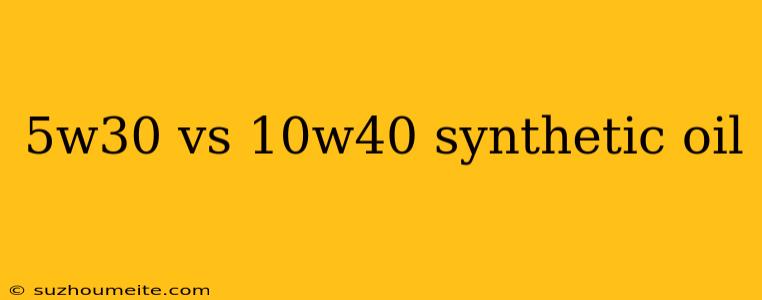5W30 vs 10W40 Synthetic Oil: Which One is Right for Your Vehicle?
When it comes to choosing the right synthetic oil for your vehicle, there are many options available in the market. Two of the most popular synthetic oils are 5W30 and 10W40. But what's the difference between them, and which one is right for your vehicle? In this article, we'll break down the differences between 5W30 and 10W40 synthetic oil to help you make an informed decision.
What Do the Numbers Mean?
Before we dive into the differences between 5W30 and 10W40, let's understand what the numbers mean. The numbers on the bottle of synthetic oil refer to its viscosity rating, which is a measure of its thickness and flowability. The numbers are divided into two parts: the "W" rating and the second number.
- The "W" rating refers to the oil's winter performance. The lower the "W" rating, the thinner the oil is, and the better it performs in cold temperatures.
- The second number refers to the oil's performance at higher temperatures.
5W30 Synthetic Oil
Characteristics:
- Thinner and more fluid in cold temperatures, making it easier to start the engine
- Better cold-start performance and fuel efficiency
- Suitable for smaller engines and turbocharged engines
- Typically used in passenger vehicles, light trucks, and SUVs
Benefits:
- Improved fuel efficiency
- Better engine performance in cold temperatures
- Suitable for engines that require low viscosity oil
10W40 Synthetic Oil
Characteristics:
- Thicker and more lubricating in higher temperatures, making it better suited for heavy-duty engines
- Better high-temperature performance and engine protection
- Suitable for larger engines, diesel engines, and high-performance vehicles
- Typically used in heavy-duty trucks, construction equipment, and industrial machinery
Benefits:
- Better engine protection in high-temperature conditions
- Suitable for engines that require high viscosity oil
- Improved durability and longevity of engine components
Key Differences:
- Viscosity: 5W30 is thinner and more fluid, while 10W40 is thicker and more lubricating.
- Performance: 5W30 is better suited for cold temperatures and small engines, while 10W40 is better suited for high temperatures and large engines.
- Application: 5W30 is typically used in passenger vehicles, while 10W40 is used in heavy-duty trucks and industrial machinery.
Conclusion:
Choosing the right synthetic oil for your vehicle depends on several factors, including the engine size, type, and operating conditions. If you drive a small engine vehicle in cold climates, 5W30 synthetic oil may be the better choice. However, if you operate a large engine vehicle in high-temperature conditions, 10W40 synthetic oil may be the better option.
Remember to always consult your vehicle's owner's manual or speak with a mechanic to determine the best synthetic oil for your vehicle's specific needs.
